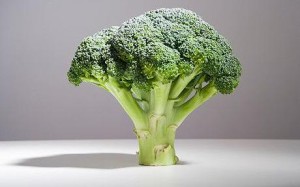Can Broccoli Make You Fat?

 I was recently asked a question about weight loss.
I was recently asked a question about weight loss.
“Can I eat peanuts and strawberries or can they make me fat?”
I thought about it for a few seconds and responded, “Anything can make you gain weight.”
I then shared a few words about calorie balance. If we eat more calories than we burn in a day, we end up gaining weight. It works in reverse too. If we eat fewer calories than we are burning each day, then we put our bodies into a weight loss scenario.
Peanuts are a good snack in moderation and so are strawberries. You can do much worse than those two foods when it comes to eating snacks.
I then asked my client what prompted her to ask such a question.
She said she read it in a diet book written by a celebrity trainer. In the book the trainer lists several items that you shouldn’t eat because they interfere with the weight loss process. That’s when I said half-jockingly, “Next thing we’ll hear is that broccoli will make you fat”. She responded with “Yes, that’s on the list too”.
You can imagine the look of shock on my face.
This conversation prompted me to do some research.
Here’s what I found.
There’s a list of food items that contain a substance called Goitrogen. This naturally occuring substance is found in soy bean related products as well as cruciferous vegetables. It’s also found in other foods like strawberries, peaches, spinach, peanuts and millet.
Here’s the quick low down on Goitrogens.
If you have a Thyroid problem (diagnosed and treated by your physician) then these types of food items can interfere with the your Thyroid function. If you have a Thyroid problem you should avoid these foods as they can make it even more difficult to lose weight. As a reminder, when you have a medical condition, you should always consult with your physician or dietician when making any dietary adjustments.
Here’s the catch.
There is no evidence that these foods have any negative effect on your weight or health when you don’t have a Thyroid problem. In fact it’s just the opposite. These food items add much to your health and fitness with the nutrients provided.
The take home message is to be careful with what you read and the advice you follow. It’s easy to hear, read or see information that may sound relevant but it may not apply to you.
Ask yourself do these recommendations actually apply to my situation? Are they making general recommendations designed only for specific individuals? Or is it just marketing and hype to sell a book or another product?
As you can guess, celebrity trainers can have a big influence on many people. They have a lot of clout. They look great, the’re on TV, and when they say something it’s easy for us to want to follow their advice.
Yet, we have to pause and ask those important questions no matter how new, exciting or relevant the advice may seem.
Does this really apply to me and my situation?
In strength and longevity,
Edward Scaduto


